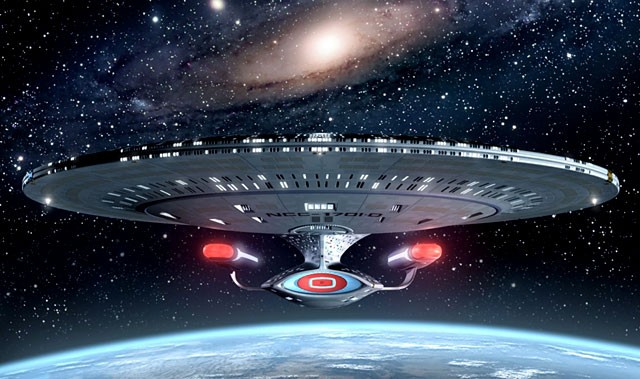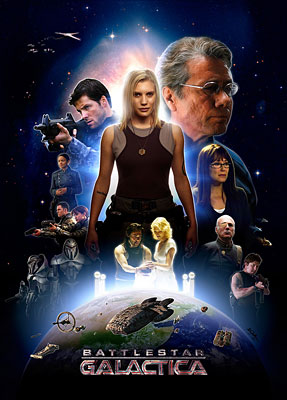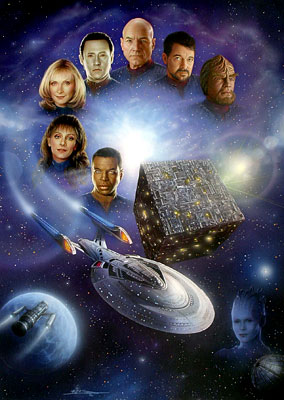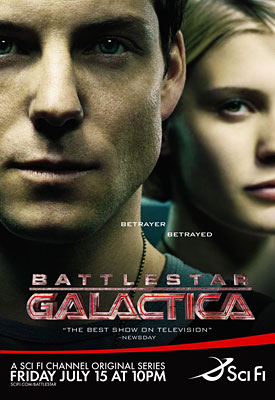The TV Drama Conundrum
By Bert Ehrmann
July 2, 2010
Until very recently, I thought that all modern TV dramas should be in the Battlestar Galactica (BSG)/ The Shield/ Mad Men format. That is, the series is presented with one long overarching story that has a beginning, middle and end which is revealed over the run of the show. I believed that the "old" way of TV dramas, where the series has a beginning, lots and lots of meandering middle and only and ending when the ratings dictated it, was obsolete. These "old" types of shows don't follow a series long story and instead tend to rely on episodes with self contained stories that don't nearly interrelate like episodes from modern ones.
However, after spending an afternoon watching episodes of Star Trek: The Next Generation (TNG), I'm not so sure that this "old" model is any worse/better than the modern one.
 Essentially, BSG told one story over the course of the series; that of the mechanized Cylons flooding out from space and in a Pearl Harbor style attack wiping out most of humanity in the process. The few survivors of the attack are forced to search for a new home and safety from the Cylons. I can't think of a single episode/story of BSG that didn't, in some way, drive forward this overarching story.
Essentially, BSG told one story over the course of the series; that of the mechanized Cylons flooding out from space and in a Pearl Harbor style attack wiping out most of humanity in the process. The few survivors of the attack are forced to search for a new home and safety from the Cylons. I can't think of a single episode/story of BSG that didn't, in some way, drive forward this overarching story.
From a fan's perspective, this modern style of storytelling is incredibly satisfying. I knew while watching BSG that as long as the series was never canceled this story would play out to some sort of conclusion.
The TNG model, on the other hand, is a bit different than the modern BSG style. Here, there is no overarching story that is followed throughout the series. Instead, the main focus of TNG is of the characters of the series and the different situations they find themselves in as they explore the galaxy. And though there were lots of storylines that would be revisited over the course of TNG (the Borg, Data's brother Lore, Q, etc.) for the most part, while each episode built upon the mythos of series as a whole, they were none-the-less self-contained.
 However, while each episode of TNG wasn't in place to drive forward an overarching story as they are in BSG, it meant that stories in the TNG series could go places and directions stories in the BSG series could not.
However, while each episode of TNG wasn't in place to drive forward an overarching story as they are in BSG, it meant that stories in the TNG series could go places and directions stories in the BSG series could not.
Some episodes of TNG deviated greatly from the standard "exploring space and hostile aliens/environments" episodes. There were funny episodes, episodes where characters traveled in time, episodes where characters and their families got together, episodes focusing on characters that usually were usually only seen in fleeting glimpses... And with each of these episodes, the audience would learn a bit more about the crew of the Enterprise.
Though we did learn lots about the characters of BSG during the show, it was all during the high-stress environment of being hunted by the Cylons. In other words, while I might know exactly what Lee Adama (Jamie Bamber) and Kara Thrace (Katee Sackhoff) are like at a time of war, I can't say I know much about what they were in different times like the long peace before the war.
Without being tied to one underlying story, we were able to learn much more about who exactly the characters of TNG were in all sorts of situations both good and bad.
 The downside to the TNG model of storytelling is that while series writers are able to explore characters and situations a show like BSG could not, it meant that some episodes tended to feel like "filler" ones and didn't reveal anything new about the characters or series. For every good episode of TNG that deviated from the norm and allowed series writers to truly explore the characters like "Family," "Ensign Ro" or "Darmok," there were just as many bad ones like "Night Terrors," "Qpid" or "Hero Worship."
The downside to the TNG model of storytelling is that while series writers are able to explore characters and situations a show like BSG could not, it meant that some episodes tended to feel like "filler" ones and didn't reveal anything new about the characters or series. For every good episode of TNG that deviated from the norm and allowed series writers to truly explore the characters like "Family," "Ensign Ro" or "Darmok," there were just as many bad ones like "Night Terrors," "Qpid" or "Hero Worship."
And though on the whole there weren't as many bad BSG episodes as there were TNG, I feel that the episodes of TNG that did work revealed the characters of the show a way that modern dramas like BSG cannot. At the end of both TNG and BSG, I felt like I knew much, much more about the characters of the Starship Enterprise than those of the the Battlestar Galactica.
I'm not saying that I prefer one model of storytelling over another, but what I am saying is that each one has its own strengths and weaknesses and shouldn't be written off for seeing a bit out of date.